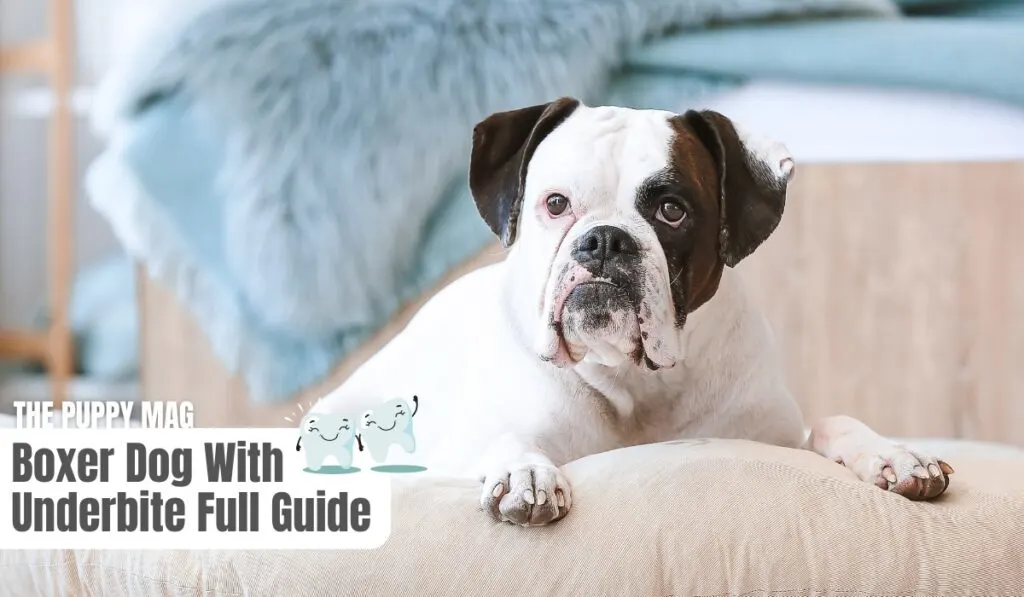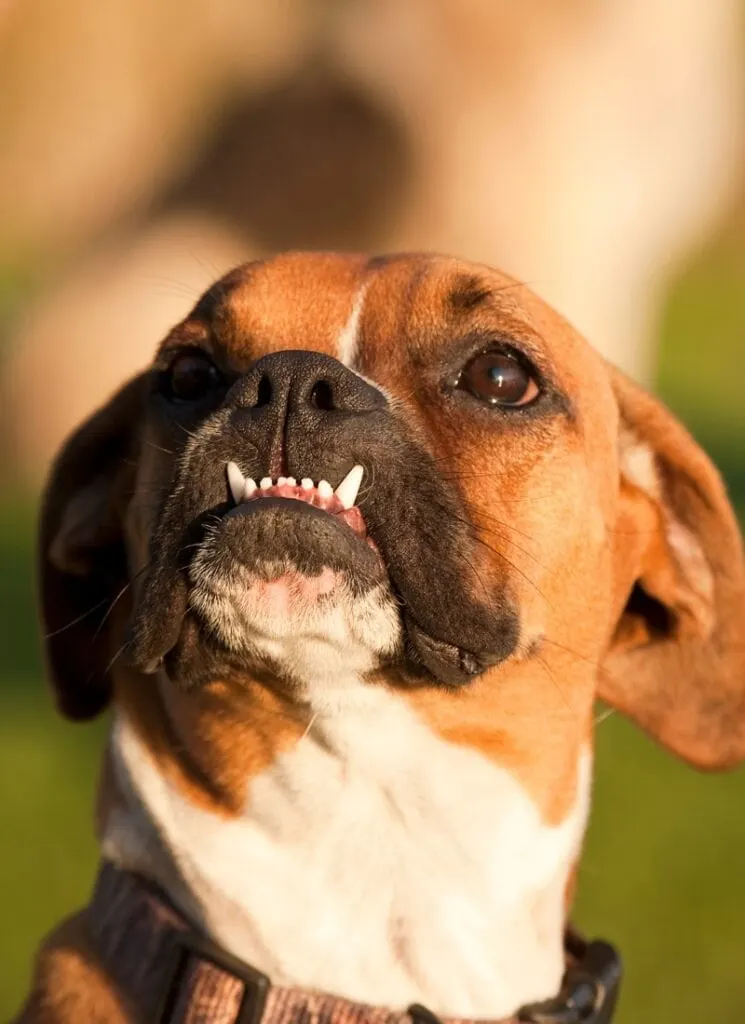If you’re the proud owner of a Boxer with an underbite, there’s no doubt your heart melts every time they look at you with that endearing grin…
While this grin does make your boxer look like the cutest dog on the planet, there are a few important things you’ll want to know.
Although underbites generally do not affect their overall health and temperament, it can lead to some issues that Boxer owners should be aware of.
In this article, we’ll take a closer look at Boxers with underbites, including what causes them, how they can impact your dog’s health, and what you can do to help keep your Boxer comfortable and happy.
So, let’s dive into the world of Boxers with underbites!

What is an underbite in dogs?
An underbite is a condition where a dog’s lower jaw protrudes beyond the upper jaw, causing the teeth to overlap or underlap.
It’s also known as prognathism or malocclusion.
Essentially, it’s the same thing as what can happen in humans too!
Some breeds are more prone to underbites than others, and there are several reasons for this alongside their genetics like injury, improper growth, hygiene and tongue thrusting. Explained below.

Do Boxers often have underbites & how do they get them?
I know what you might be thinking… Is my boxer extra special, or do a lot of boxers have this?
Despite being one of the breeds most prone to this issue, not all boxer dogs inherit or develop underbites. Many have correctly aligned jaws and teeth.
So how does it happen?
In the vast majority of cases, having an underbite is due to their genetics and is a hereditary issue passed down.
This means that some Boxers may be born with an underbite, while others may develop one over time.
In some cases, underbites can also occur due to injury or improper jaw development during puppyhood.
Other causes include poor dental hygeine, and tongue thrusting
Tongue thrusting is where you boxer might develop a habit of putting his tongue between the front teeth while swallowing. Overtime this causes continous pressure on the jaw which can lead to misalignment and eventually an underbite.
So to sum that up, the main causes of underbites in boxers are:
- Genetics
- Improper jaw development during puppyhood
- Injury or trauma
- Poor dental hygiene
- tongue thrusting
Related: 13 Breeds With Underbites! Full List
Is it bad for a Boxer to have an underbite and does it progressively get worse over time?
Having an underbite doesn’t necessarily mean that your Boxer is in pain, but it can lead to some issues over time.
The severity of the underbite can increase as the dog grows older, which can potentially lead to more problems.
For example, a severe underbite can lead to difficulty eating or picking up food, excessive drooling, and tooth decay or loss.
In more severe cases, an underbite can cause difficulty breathing or eating, which can be a serious concern.
If you have a boxer with a very slight underbite it’s highly likely this is causing them no issues, but if it’s severe then it could be impacting their life, at which point it’s important to seek veterinary help.
Interestingly enough, according to Dr. Santiago Peralta, assistant professor of veterinary dentistry and oral surgery at CUCVM, she says “The reality is, most dogs that have some kind of malocclusion will have had it for the vast majority of their life, and so often, they will be in pain, but they may not necessarily overtly show that.”
Problems that an underbite can cause:
I know i’ve been saying there mostly isn’t any issues with mild underbites, it’s still important to know what can potentially happen.
It’s true that slight to mild underbites usually cause no adverse affects, but owners should be aware of the following.
- Difficulty picking up food or toys: Boxers with underbites may have difficulty picking up food or toys due to the position of their teeth.
- Excessive drooling and/or messy eating: An underbite can cause excessive drooling and messy eating, which can be frustrating for both the dog and the owner.
- Irritation or infection of the gums or mouth: An underbite can cause irritation or infection of the gums or mouth, which can be painful for the dog.
- Tooth decay or loss: Boxers with underbites may be more prone to tooth decay or loss due to the position of their teeth.
- Difficulty closing the mouth properly: In some cases, an underbite can make it difficult for a Boxer to close their mouth properly.
- Difficulty breathing or eating: In more severe cases, an underbite can cause difficulty breathing or eating, which can be a serious concern.
If you notice any of these issues happening with your boxer, then it’s definitely time to schedule a vet check up to talk about treatments… Which brings me nicely to our next point!
My personal experience: My friend had a boxer with an underbite, and it was only considered a mild one by her vet, yet it started to affect her breathing when she began panting continously. While her underbite didn’t get worse, her ability to deal with it declined (which is kind of unusual, that’s what happened!) and so my friend took her to the vet and began the process of treatment via a brace that gently moved the teeth. Her gorgeous boxer now has almost not underbite, and can breathe perfectly.
Are there any treatments for Boxers with underbites and can it be fixed?
The treatment for an underbite in Boxers will depend on the severity of the condition. In mild cases, no treatment may be necessary.
However, in more severe cases, treatment may be required. Here are some options:
- Orthodontic treatment: This involves using braces or other orthodontic appliances to help move the teeth into a more appropriate position. This is typically recommended for moderate to severe underbites.
- Extraction of certain teeth: This may be recommended to relieve pressure and reduce the severity of the underbite. This is typically recommended for mild to moderate underbites.
- Surgery: This involves reshaping the jaw to correct the shape of the underbite. This is typically recommended for severe cases.
It’s important to note that while treatment can help improve the appearance of the underbite and alleviate some of the associated problems, it’s not always necessary or recommended.
You should always consult with a veterinarian or veterinary dentist to determine the best course of action for your Boxer.
The typical costs of treatment:
The costs of treating an underbite in Boxers will vary depending on the severity of the condition and the type of treatment required. Here are some rough estimates:
- Orthodontic treatment: $1,000 – $5,000
- Extraction of certain teeth: $200 – $500
- Surgery: $1,500 – $4,000
How to care for a Boxer with an underbite:
If your Boxer has an underbite, there are some things you can do to help alleviate any associated problems and ensure they are comfortable.
I mostly consulted with my friend, the one who had a boxer with an underbite, and my veterinarian, to create this list.
It’s only a handful of things, but these are the best ways to help your boxer if they have an underbite:
- Use a raised food and water bowl to make it easier for your Boxer to eat and drink.
- Brush your Boxer’s teeth regularly to help prevent tooth decay and gum disease.
- Monitor your Boxer’s eating habits to ensure they are able to pick up and chew food properly.
- Regularly check your Boxer’s mouth for signs of irritation or infection.
- Work with a veterinarian or veterinary dentist to determine the best course of treatment, if necessary.
Other than that, owners just have to focus on providing their boxer with an ideal daily routine and keeps them as happy and healthy as possible.
Last thoughts
In summary, underbites are a relatively common issue among Boxers, but it’s not always a cause for concern.
While some Boxers may experience problems associated with their underbite, others may not have any issues at all. And it usually doesn’t affect their temparement or ability to live a happy life.
Still, If your Boxer does have an underbite, it’s important to monitor them closely and consult with a veterinarian or veterinary dentist to determine the best course of action.
With proper care and attention, Boxers with underbites can live happy and healthy lives.
